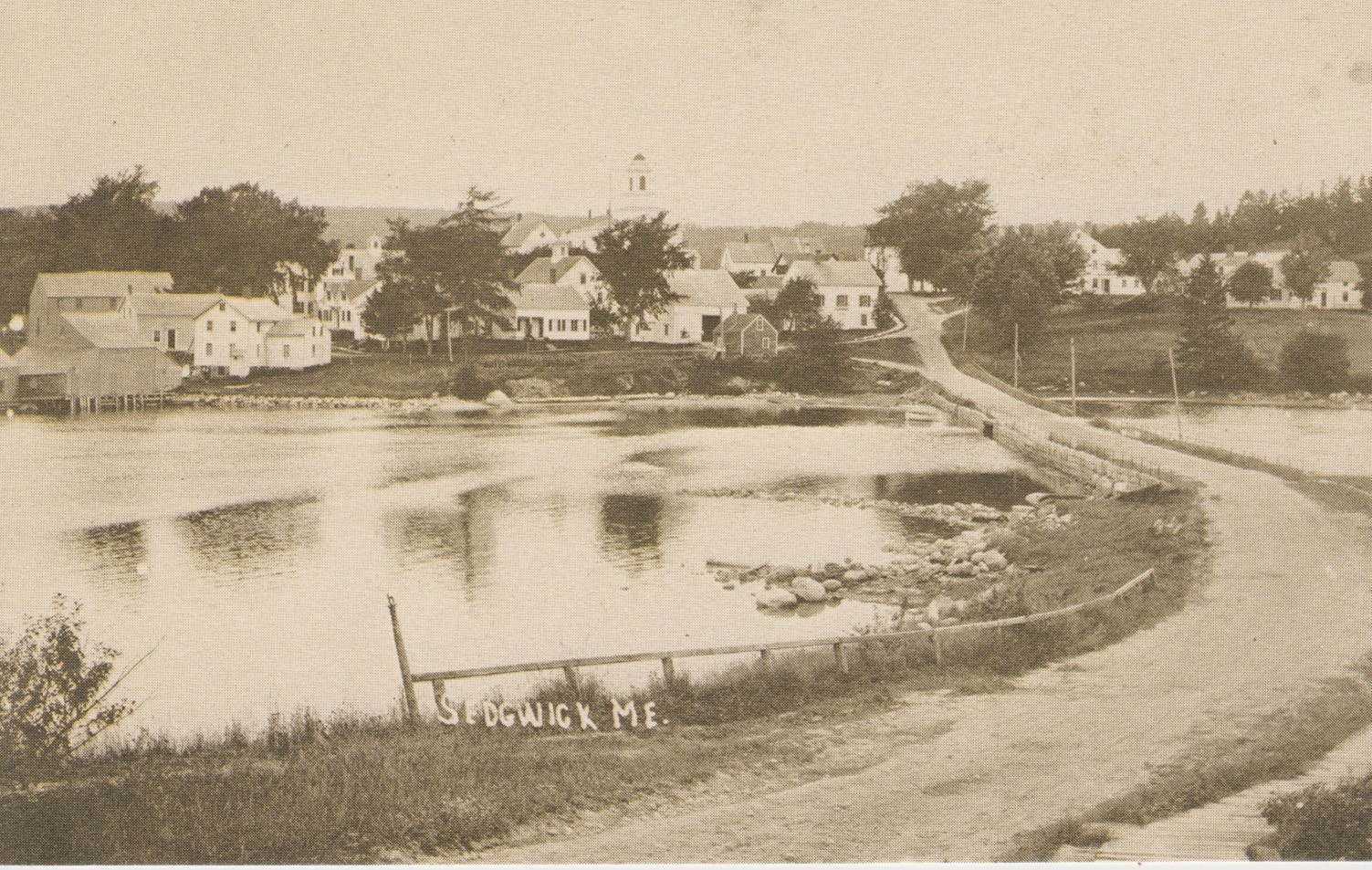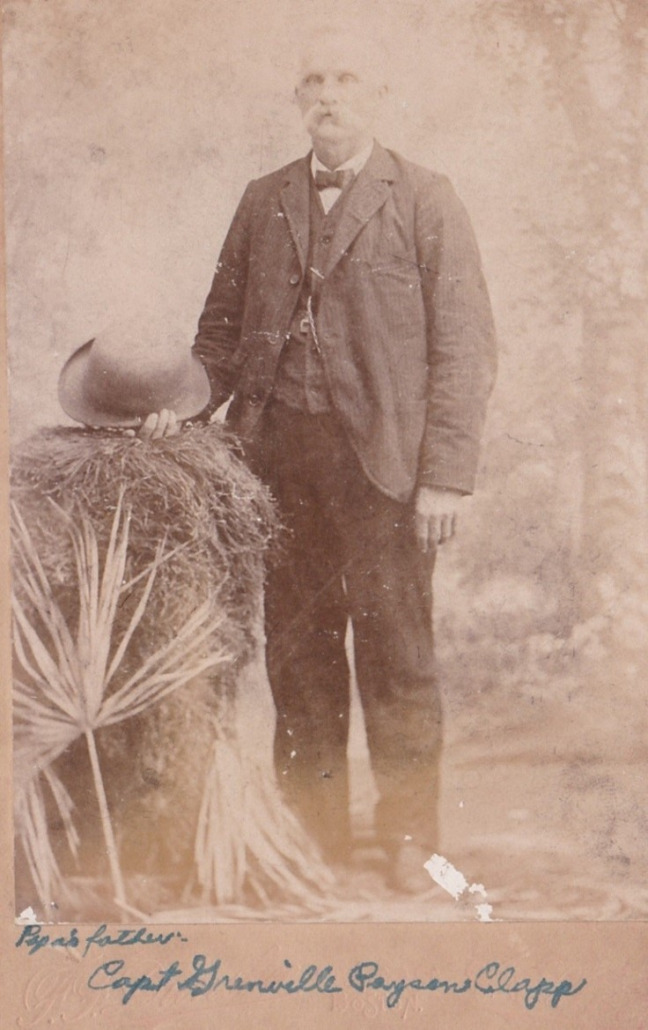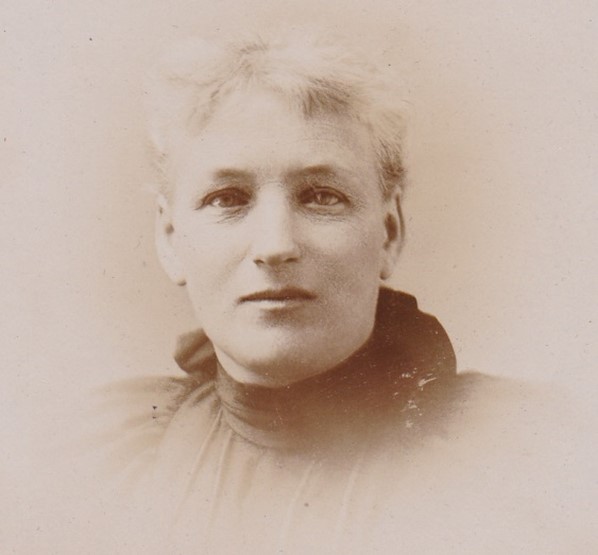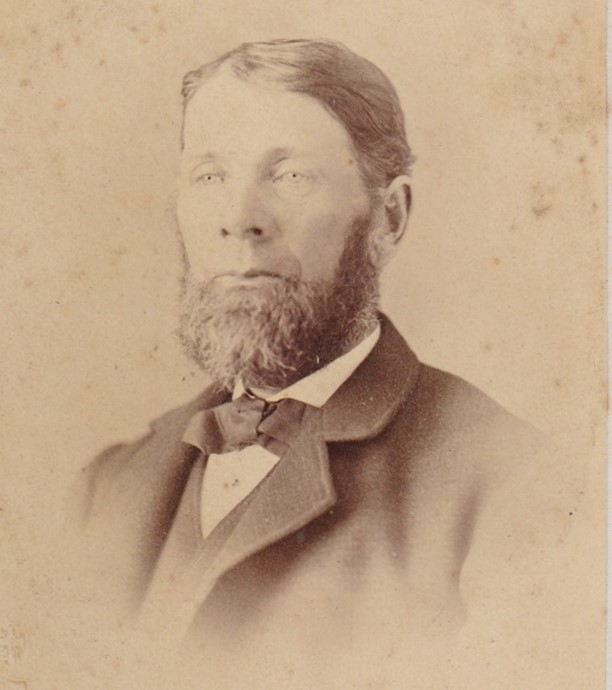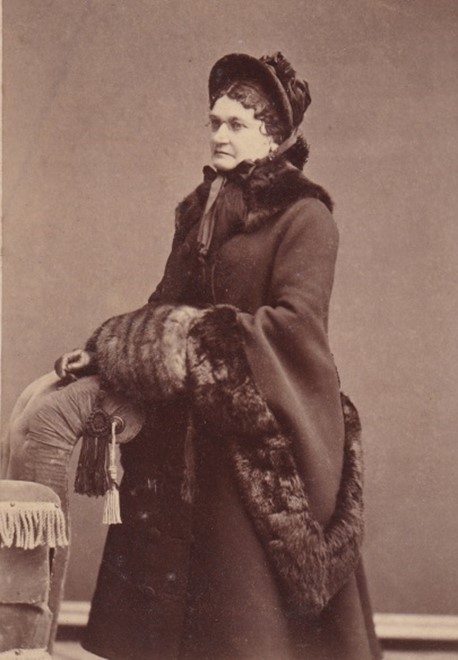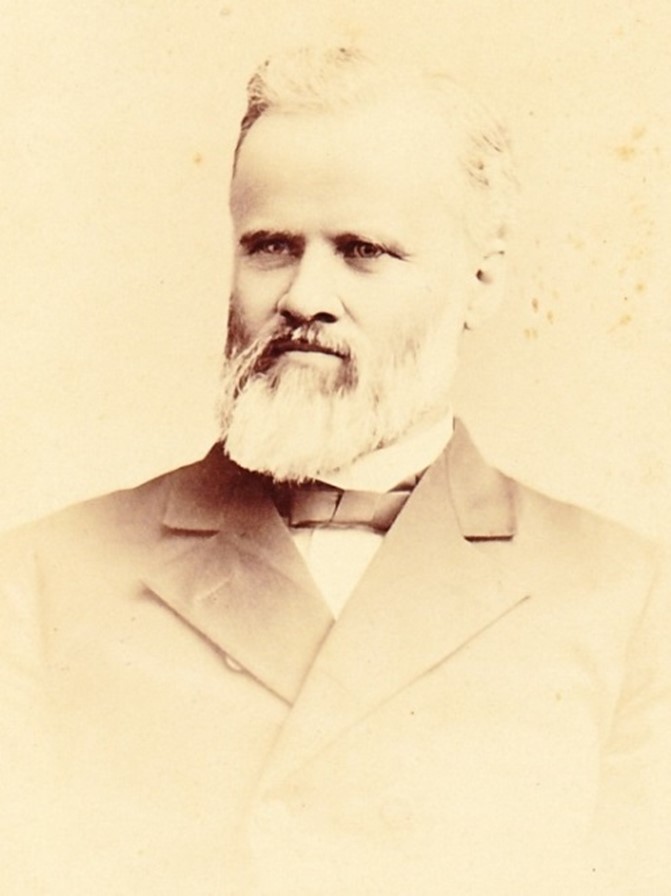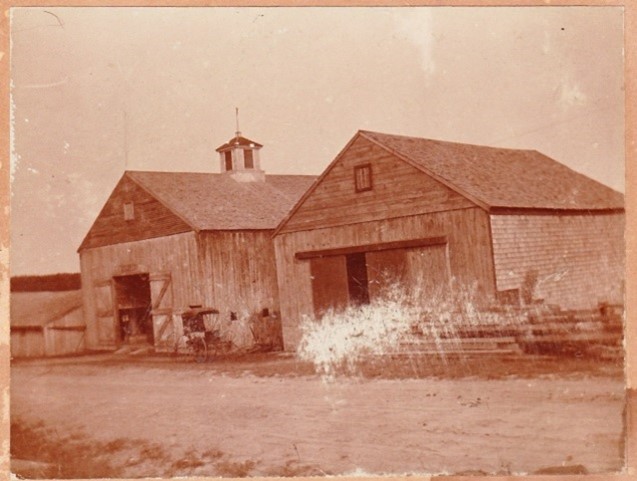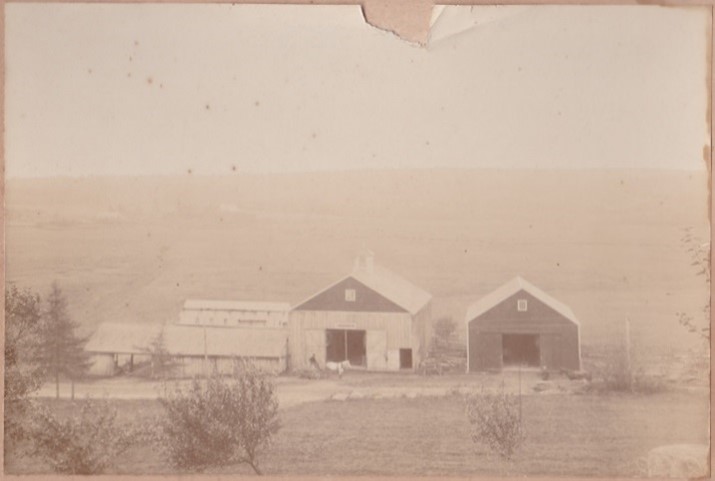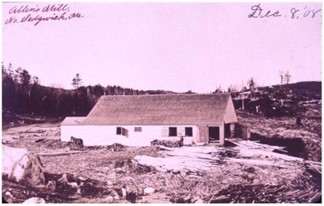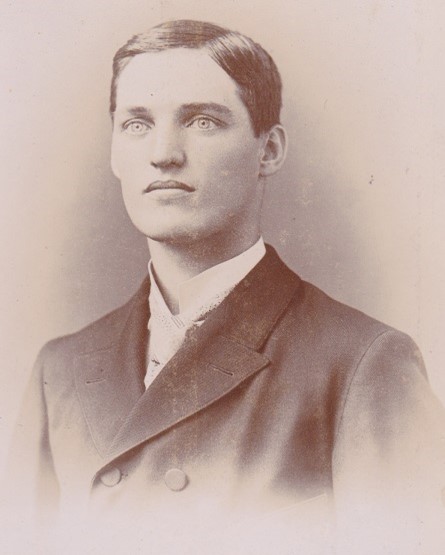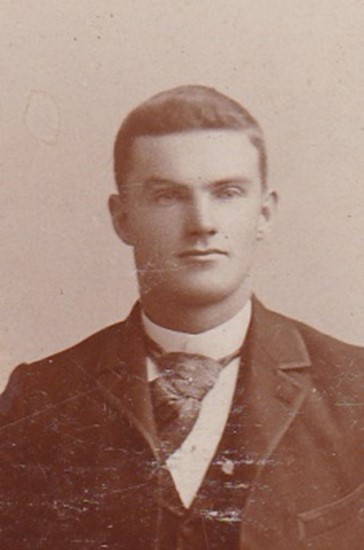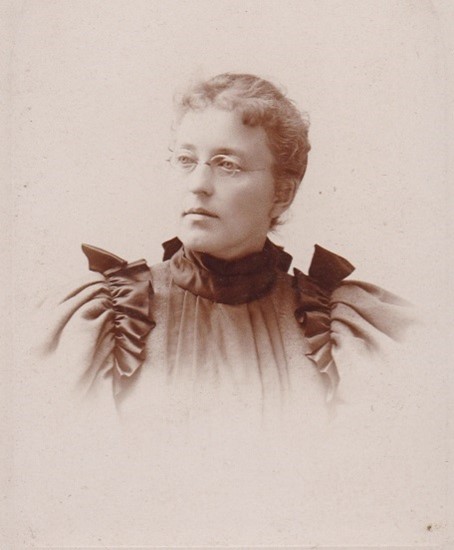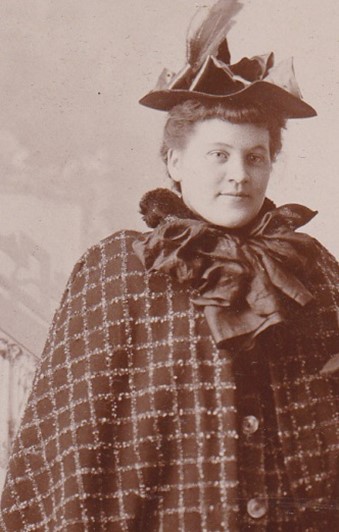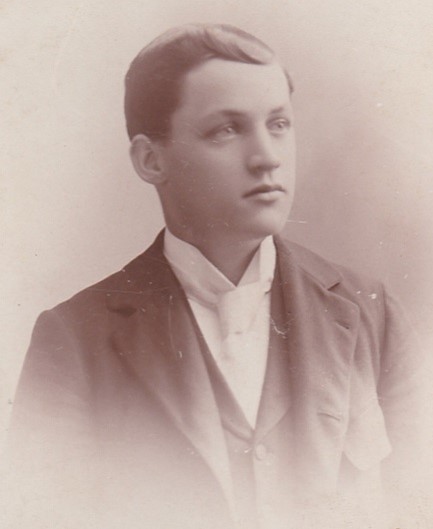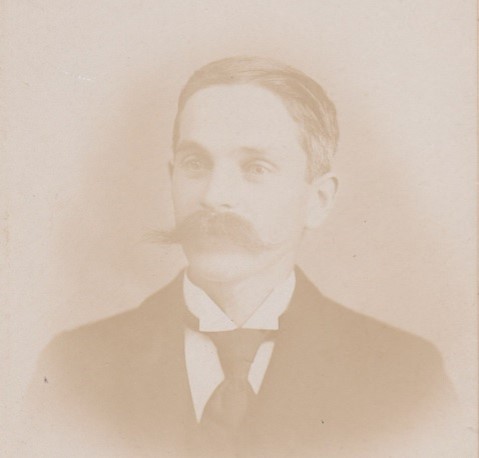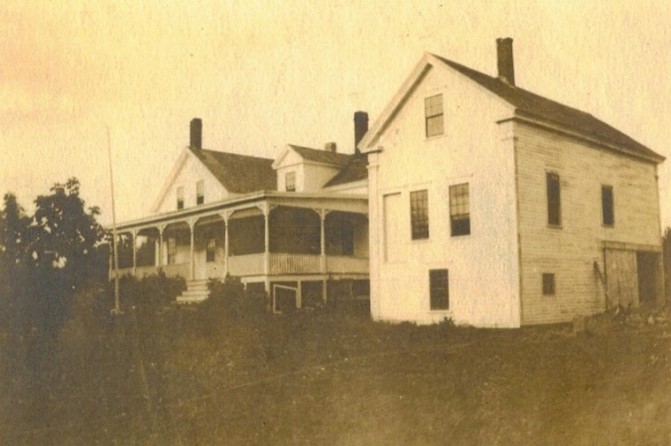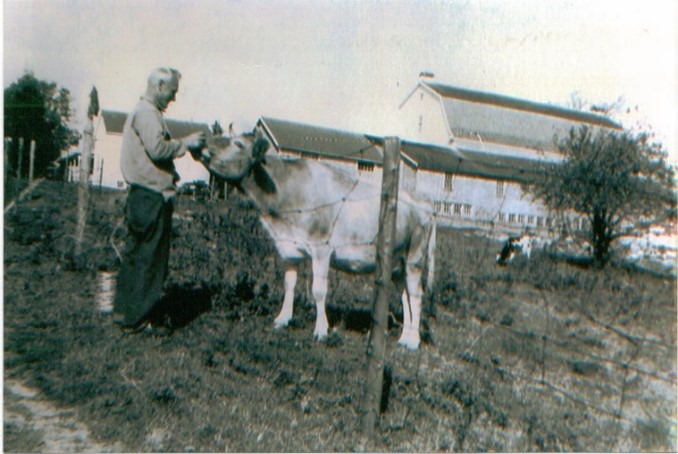Clapp and Thurston Families in Sedgwick (PEO.15)
Photos and text that tell the stories of these influential families
The Clapp and Thurston Families in Sedgwick, Maine
Over a period of many years several generations of the Thurston and Clapp families have invested untold time and energy in collecting, preserving and sharing the stories and photographs of their ancestors. Among them have been the following: the Sargent sisters (Catharine Marston, Helen Means, and Abby Kelly), Alice Clapp Anderson, Carolyn and Mark Clapp, Fred Marston, Diana Marston Wood, Rozella Maresca Webb, Stephen Maresca, Jim Anderson, and Susan Webb. This narrative includes many of those writings and images that brought to life the adventures, daily struggles, world view and courage of these men and women who came to, and lived in, Sedgwick many years ago.
The Clapp Family in Sedgwick
Roger Clap (sic) is said to be the first of the Clapp family to have immigrated to America from England, having arrived in 1630 on board the Mary and John. He was among the first settlers of Dorchester, MA. And, later, as Captain Roger Clap, was a man of prominence in Boston.1
Carolyn and Mark Clapp, who live in Texas, shared the following information about the origins of the first Clapp family in Sedgwick.
“Sylvester Clapp was born about 1792 in Easthampton, Mass. and, as a young man, attended Williams College, and then, Union College from which he graduated in 1823 before moving to Bangor Theological Seminary from which he graduated, possibly with a degree equivalent to a M.Div.
In 1824 he moved to Blue Hill where the Rev. Jonathan Fisher became his mentor and landlord. Sylvester lived with the Fisher family for several years while he was the preceptor at the Blue Hill Academy, a theological school created by the Reverend Jonathan Fisher and, in 1830, he became an ordained minister. He married Rozella Carleton after she became a widow and they went to Aurora, Maine to the mission church. When, in 1836, Rozella’s mother Molly died, he resigned his post and they moved into the Carleton home in Sedgwick to care for her father, David Carleton. Later, they used land she inherited from Adam Cogswell, her maternal grandfather, to build their own home, which became the Clapp homestead.2 In time, Sylvester and Rozella moved to Middleborough, MA. I am not sure why they went there but there was an intellectual/religious community in Middleborough and there is some evidence that Sylvester was close friends with some of the residents there. Both Sylvester and Rozella are buried there. After his parents moved, Captain Grenville Clapp bought the homestead from them and, in time, was the only one of their children to stay in Maine. I think the farm and the sea were the motivation. His mother’s family, the Carletons, was in the shipping trade and Grenville undoubtably used their connections to have ships to sail.
Though originally from Massachusetts, the Clapp family has deep roots in Sedgwick through Sylvester, Grenville and their wives.”
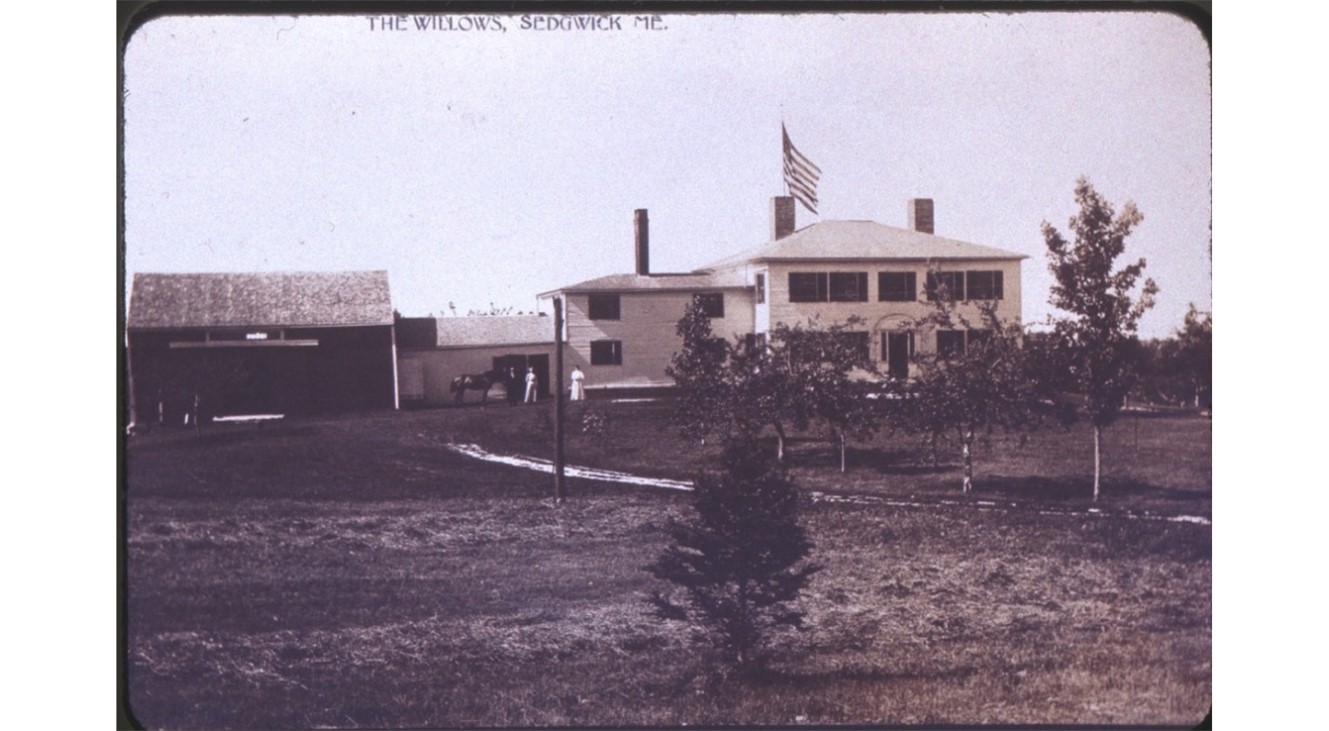
This photo of the home of David and Mary (Molly) Cogswell Carleton was taken in the late 1800s. The house, called “The Willows”, was built in 1802.
More about Rozella Carleton:
Rozella Carleton’s father, Major (Revolutionary War) David Carleton and her maternal grandfather, Adam Cogswell, were Sedgwick proprietors who obtained much of their land in North Sedgwick by having been among the citizens of Massachusetts who, with David Marsh in 1762, were granted land in Maine, then still part of Mass., by the Massachusetts court.
Rozella Carleton, Sylvester’s wife was the third of Major David and Mary (Molly) Cogswell Carleton’s daughters named Rozella. The first Rosella was born in 1795 and died in 1798 at the age of four years. The second was born in 1799 and died in 1803, also at the age of four years. The third daughter named Rozella was born in 1805 and survived until 1864. The first two Rozellas, both called Rozelly, are buried together in the Rural Cemetery in Sedgwick.
The third Rozella, when 20 years old, married Dr. John Gale Merrill in a ceremony performed on July 4, 1825 by John’s dad, the Reverend Daniel Merrill. Rozella and John had a daughter, Mary Rozella Merrill, born June 4, 1826 but, sadly, the child died September 21st and her father John died September 29 1826. The baby was just 3 ½ months old and her dad was 29.
On October/August 9 1827, Rozella married thirty six year old Sylvester Clapp (born Oct 11 1791 in Middleborough, Plymouth, MA.). We like to think that Rozella had a happy life with Sylvester and their children but you can’t help but imagine that she may have had some painful memories.
Sylvester and Rozella had seven children: David Carleton Clapp (1828), Rodney O. Clapp (1830), Grenville Payson Clapp (1832-1893), Mary Ellen Nellie Clapp (1835-1859), Francis W. Clapp 1838-1859) and Rowland C. Clapp (1841-1910).
Grenville, the only one of the children to stay in Sedgwick, was both a farmer and a sea captain. He first married Eliza Hannah Allen (born Sept 1 1841-died May 12, 1871) and they had a son, Rodney D. Clapp, born Jan. 11 1868. 3 Eliza died, apparently of tuberculosis, at the age of 29 and is buried in Pine Grove Cemetery in North Sedgwick.
Eliza’s obituary
“North Sedgwick, May 12, Mrs. ELIZA H. wife of Capt. Grenville P. Clapp and only daughter of Deacon Isaac M. Allen, age 29 years, 8 months. Mrs. C. was granddaughter of Rev. Daniel Merrill, extensively known as the first pastor of the First Baptist Church in Sedgwick. She was a consistent member of the Baptist church at North Sedgwick. She accompanied her husband on several foreign voyages, returning from the last in June 1870 in feeble health from insipient consumption. From that time she remained at her father’s house until called to a better mansion on high. Her last days were remarkably peaceful. By a kind Providence, Capt. C returned from Russia three weeks before her departure and was with her through the last days of her life. She leaves a little son about 13 years old.”4
Grenville then married Clara Maria Thurston on October 1 1871. Clara (born Feb 11 1852-died 1933) was the daughter of Daniel Oliver (born May 5 1805-died Jul 19 1885) and Apphia Kimball Hinckley Thurston. Clara, who was 20 years younger than Grenville, was “the girl next door”, in that her parent’s home and farm was close to the Clapp home near the Salt Pond in North Sedgwick. Grenville and Clara’s children were Eugene Payson (1872-1950), Rowland Grenville (1874-1949), Nellie Eliza (1877-1944) and Harvey Thurston (1879-1956).
Grenville and Clara lived in the home Grenville had purchased from his parents when they moved to Middleborough, MA. The property is said to have included additional land Rozella had inherited from her maternal grandfather, Adam Cogswell, one of the proprietors who obtained land as part of the 1762 David Marsh Land Grant.4
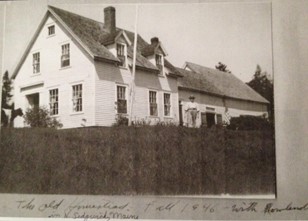
This is a fall 1946 photo of the Grenville and Clara Clapp homestead in North Sedgwick with their son Rowland Clapp standing in front.
Alice Clapp Anderson lived in the house for many years. The house has been torn down but the property is still in the family.
David Thurston was the first of that family to make their home in Sedgwick.
“David was born in Rowley, Mass. March 19, 1751, the son of Dea. Richard and Mehitable (Jewett) Thurston of Rowley, now Georgetown, Mass. He wed first Mary Bacon (b. 18 Aug. 1750, d. 21 Oct. 1790) only daughter of Rev. Jacob and Mary (Wood) Bacon of Rowley and by her had 1. David b. 6 Feb. 1779 who first married Eunice Farley and married second Prudence Brown, 2. Richard. B. 5 July 1781 married Ann Bowers.
David’s second wife was Chloe Redington, born May 11, 1767, the daughter of Abraham and Sarah (Kimball)Redington of Boston, Mass. Abraham died at a young age so Chloe’s mother gave Chloe, while an infant, to her Aunt, Mrs. Rev. Jacob Bacon.
The eleven children of David and Chloe Redington Thurston were; Mary (born April 7 1792), Samuel (born July 8 1793), John (born November 26, 1794), Sarah (born April 1, 1796), Stephen (born December 22, 1797), Mehitable (born February 5, 1800), Hannah (born November 16, 1801), Chloe Thurston (born June 18, 1803), Daniel Oliver Thurston (born May 5, 1805), William Thurston (born February 7, 1807), and Phebe Thurston (born March 15, 1809).
David Thurston, was a farmer in Rowley until 1795 when he made a prospecting journey to Maine on horseback, stopping at many places to see what advantages they offered, but with the resolution that he would not locate where there was no orthodox minister. In conversation with a gentleman in Bangor he said, “I have money in my pocket to buy this land”, which included all that is now Bangor City, “but I will not settle where my family cannot have the Gospel.” So he went on forty miles to Sedgwick, where the Rev. Daniel Merrill, a pupil of Dr. Springer, senior, was pastor of a Congregational church. Having purchased a farm he returned to Rowley, and in April, 1796, he took his son Richard and went to Sedgwick to sow and plant for the season, and then returned for his family who took passage in a sloop from Newburyport to Blue Hill Falls. There with four children, the oldest four years old, they were put into a boat and rowed four miles to the old saw mill in the dead of night. Here they waited for the dawn. David and Richard came with an ox-team to take them to their new home, which was rough and not very clean. Sometime after, a quantity of milk having been spilled, mother called to the maid, “Patty, Patty, I have found the floor. (This incident was related by one of the children).
David was a man of commanding presence, nearly six feet high. He held the reins of government with a strong hand; exerting a molding influence on the character of his large family, so that not one fell into habits of vice. In his religion he was firmly orthodox, owning and studying such works as Edwards and Hopkins. He was constant in family worship, taught his children the Assembly’s catechism, and so influenced them that they have all remained steadfast in the orthodox faith. He was selectman of Sedgwick and justice of the peace many years.
After the Rev. Dr. Merrill with a majority of the church in Sedgwick became Baptists under the lead of David Thurston, other ministers sent by the Mass. Missionary Society, such as Rev. Daniel Lovejoy, Jonathan Sewall, John Sawyer and Daniel Oliver of Boston (who baptized and gave the name to David’s son Daniel Oliver Thurston) labored there at different times.
Mrs. Chloe Thurston was a bright, sprightly woman, of great energy and endurance, and did wonderful work in the care of a large family, for which they bless her memory.6
David and Chloe’s son Stephen (born 1797) continued in his father’s pious ways as a minister in Searsport, Maine. His continued relationship with his family and mentors in the Sedgwick area, is reflected in this entry in Mary Ellen Chase’s book, “Jonathan Fisher, Maine Parson 1768-1847”, regarding the September 22, 1853 death of Reverend Fisher in Blue Hill: “The Rev Stephen Thurston of Searsport, whom Parson Fisher had taught as a young boy and as a member of his family, preached his funeral sermon in the meeting house on Sunday, September 26th.”7
David Thurston died in Sedgwick, ME., Aug. 26, 1821, aged 70 and his wife (Chloe) died at the ripe old age of 95 years, 5 months on Oct. 12, 1862 in Bucksport, where she spent the last few years of her life with the family of her daughter, Mrs. Blodgett. Chloe and David are buried in Rural Cemetery in Sedgwick.
We will focus on David and Chloe’s son Daniel Oliver Thurston since he and his wife are the ancestors of many Sedgwick citizens.
Daniel and Apphia Thurston were married Jun 01, 1843 and had ten children: David (b. Apr 11, 1844), George Henry (b. Oct 9, 1845), Franklin H. (b. Oct 26, 1847, died Oct 1864), Daniel (b. Dec 1, 1849), Clara Maria (b. Feb 11, 1852), John (b. Feb 3, 1854), Frances Goodale (b. Mar 12, 1856), Ella H. (b. May 16, 1858), Jennie S. (b. Mar 20, 1861), Fred N. (b. Mar 1864).
“Mr. Thurston (Daniel) always lived on the homestead (in North Sedgwick) and was a thrifty farmer and lumberman, having acquired a competence, beside giving his children a good education. He was a man of very strong home sympathies, very seldom going out of town. He had an active, energetic business habit, with a wonderfully bright and cheerful nature, which made him a favorite among his relatives and all who knew him. Of his death it was said; “Daniel retired Saturday night in good health, after a hard day’s work at haying, and was found dead Sunday morning, July 19, 1885, with no signs of distress or struggle.”
Daniel’s wife Apphia was the daughter of Nehemiah and Phebe Peters (Kimball) Hinckley of Blue Hill, ME. She was a member of the Congregational Church in Blue Hill and was greatly beloved by all. She died June 2, 1878 and, with her husband, is buried in Rural Cemetery.”8
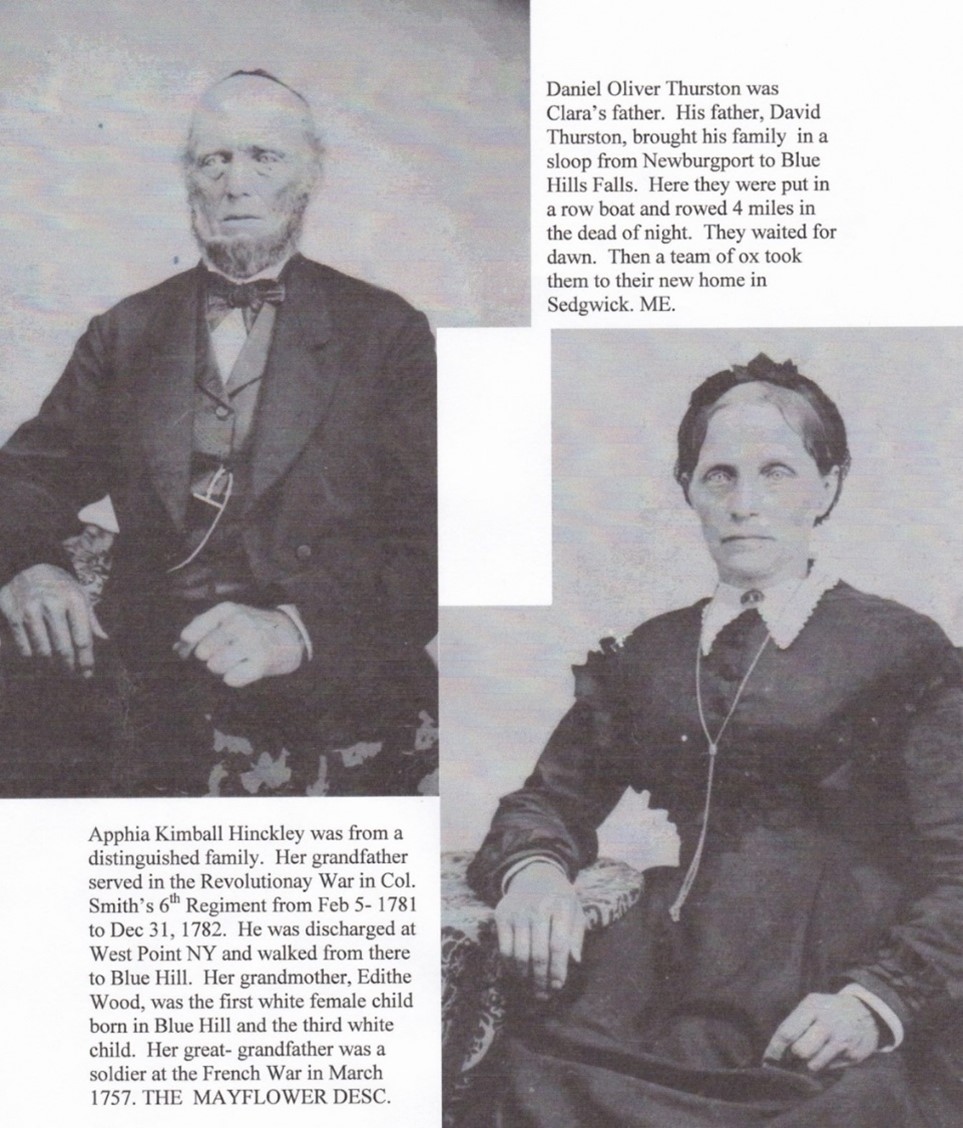
Upon the death of Daniel and Apphia, their farm went to their son John (born 1854) and it was sold out of the family when John died in 1928.
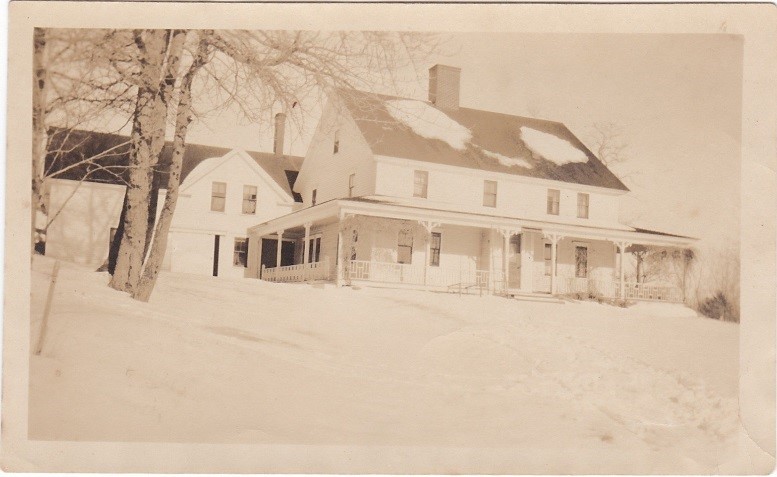
The Thurston home was built by Benjamin Friend and sold to David Thurston in 1796. The Great Meadow across from the farm now belongs to the Blue Hill Heritage Trust.
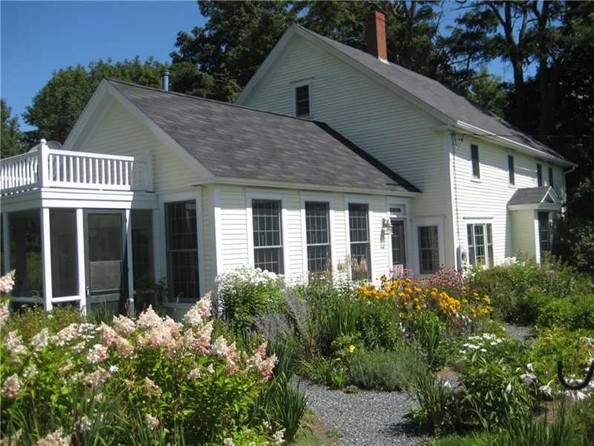
This is the Thurston house in 2014. It is on the North Sedgwick Road before the intersection of Hale’s Hill Road.

There were several barns on the Thurston farm. This one on the North Sedgwick Road lasted into the 1980s in stages of decay.
John Thurston was an industrious farmer and also had a steam driven saw mill on the Carleton Stream that flowed through his property.
He never married but his sister Ella and brother Fred lived with him for several years.
The Clapp and Thurston families in Sedgwick were joined when, in 1871, Clara Maria Thurston, the daughter of Daniel Oliver and Apphia Thurston, married Grenville Payson Clapp the son of Sylvester and Rozella Carleton Merrill Clapp.
Thanks to the Clapp, Thurston and Sargent families we have a few photos, letters and documents, such as those that follow, that give us snapshots of the lives of Clara, Grenville and their children.
When a child completed elementary school it was common for them to stay with relatives or friends in towns that had higher level education available. The following transcribed letter from Apphia to her daughter Clara suggests that Clara is living with her aunt while attending school, possibly in Castine. The letter portrays Apphia as a bit of a micro-manager but Clara would only have been 12 years old at the time so detailed advice may have been in order.
“Sedgwick, March 12, 1864
My very dear daughter Clara,
We received your letter last Friday eve. Was very glad to hear from you but sorry to hear that you are a week too soon. The children (as do we all) miss you very much. Fannie (Thurston) and Ella (Thurston) could hardly speak the day you left without crying they were so lonely-George has not gone yet will go soon Colon (Ober) is at home on a furlough has made us a visit-David (Thurston) went home with him. _dn Closson and Janie Sargent have passed an evening with us since you left- they inquired particularly about you-Edwin __ and his wife have just called.
You wrote about getting something black for your slate colored dress. I could not understand what. I hope you will dress so that your friends will not be ashamed of you. I will try to send you some money so that your very kind Aunt will be able to supply your wants. Be as little trouble to your friends as you can. Do your own mending when you can, do it neatly and keep your clothes and room in order without being told to.
Clara I do hope you will write with more care. You will never become a handsome writer unless you take pains to improve. You will attend a writing school from which you will receive benefit. There are a great many things which you need to make you passable and which I could not obtain for you before you left. Perhaps Bell has things she has outgrown which could do nicely for you and perhaps would cost you less than new. You must write all about yourself and wants freely so we may know what to do for you, for I shudder at the thought of your being up there a __ of trouble and mortification to our friends but I trust it will not be so.
It has been snowing now almost two days so that it looks quite winterish—hope it will be warmer after it clears off. Do Clara be careful of your health keep your feet dry. Write as often as you can consistently—have your lessons well committed. Let me know what your studies are.
The little girls want me to give a whole lot of love to you. So do all the family-I must close.
Accept much love from Your aff. Mother A.H. Thurston (Apphia Hinckley Thurston)”
The following transcribed letter from twenty-one year old Clara to her mother Apphia was written while Clara and her toddler son Eugene, born October 5, 1872, were on board ship with 41 year old Grenville. Clara’s resilience is amazing, particularly in view of the unmentioned fact that she was four months pregnant with her second son, Rowland (born May13, 1874), who is said to have been delivered on board by Grenville while they were becalmed for six weeks in the China Sea!
“Atlantic Ocean Lat. Long.
Dec. 12, 1873
My Dear Mother,
I will commence a letter to you now as I have a little time when it is calm enough so that everything is not running about the cabin at its own pleasure. We have had terribly rough weather: the decks haven’t been dry a single day since we sailed. When we came out of Marseille we pitched right into a head sea. I was seasick for a day or two. Grenville and mate came very near being sick and even Genie was sick enough to__. Next came a gale. We put back about one hundred miles for a lee, and since then it has been as Shep would express it a conglomeration of squalls, head winds, fair winds, calms, thundershowers and rainstorms. We have had some very heavy squalls. Some of the sails carried away, others torn and strained. A sea came in the other day and burst the bulwarks out to make its way into the ocean again. So there is a large hole in the side of the vessel above decks, of course. I have often thought of Charlie Herrick and thought how good it must seem to him to go to bed in a storm and not think he might be called at any moment to take in sail or climb the yards, and get wet from head to foot. I shouldn’t think he would even want to go to sea any more. Grenville says he dreads a collision at sea more than anything else and I found it to be true for we came very near meeting one on the Mediterranean. Our 2nd mate isn’t good for anything and it was his watch on deck. Grenville had just gone asleep ( and was very tired for he hadn’t a night’s rest for a long time) when he came down and said a vessel was coming down on us. When he got on deck it was but a few feet off. He got her off a safe distance, came below again, just got asleep when he was called again for he said she was surely coming on this time. G. ran on deck, and she was so near he thought to put his hand out to keep her off. It was a man of war and G. says if it had come across our stern once with her iron bow it might have entirely disabled us. But kind Providence interfered and we got clear you may be sure. G. stayed on deck until it was the mate’s watch after that. Well, enough of this. I suppose you are all freezing. I can’t realize that it is winter. It is uncomfortably warm here but we have a nice fair wind and are being carried along by the trade winds towards Cuba. If they continue we shall arrive there in ten or fifteen days. I should like to stop in and see you and see you all very much. I suppose you have had Thanksgiving. I thought of you, should like to have been there, but we did nicely, if we didn’t have turkey, we had chicken. I suppose David was at home. Guess I shall write to him when I can. Eugene is all well now, and as fat as can be, he weighs 27 pounds and has ten teeth, but it has been so rough, he hasn’t had any chance to run alone although he has quite a notion of going off by himself. Does Harry go alone yet? Genie climbs so that we are obliged to keep the stairs stopped up that go up to the quarter deck. He will go up there very sprightly. He is now trying to climb over a coil of ropes and get forward where the sailors are and is bidding the Steward bye bye. He will look back and see if we are following him. If we are he will hurry on all the faster.
Dec 21, 3A.M. This morning we made Turks Island and in a short time a boat came off with a pilot to see where we were going. It is an English island. The pilot told us considerable home news. Probably you will see us reported from there if you look. Now we have passed that and are near Caicos Bank. The reef runs off six miles and we can see the breakers very distinctly. I hope we shall pass them before dark. They look wicked. The water is dashing I presume fifty feet high. We are now nearly 1000 miles from Havana so you see we have quite a distance to go yet. Grenville caught a large shark the other day. I have saved the backbone which is considered a curiosity and some of the teeth. We have fresh fish in abundance for there are dolphin around almost all the time. The day they caught the shark there was a large whale near us for some time.
Dec. 24, 7P.M. Grenville and mate are playing checquers on the lounge so I take my light and seat myself to write a little. It is the night before Christmas. Please imagine my stocking waiting for a big apple and all the other good things. I presume school is keeping now. How is the teacher liked? Is David (Thurston) at home this winter? We are having another very long passage. The vessel is too deeply loaded drawing about 18 feet and is only marked to draw 16 feet. We are off the coast of Cuba where the rebellion is going on. That pilot told us of an American vessel being taken by the Spaniards and all on board shot. I suppose you have seen an account of it. They are called a bloodthirsty race. I am anxious to get into Havana, for I want to hear from home very much. Are Tillie and Emma going to housekeeping? And what kind of husbands have they got? Do they look as well as Isaac? I saw a lot of collars like the one Grenville gave Ella in the store windows at Marseille. So I presume they are fashionable. You mustn’t neglect to write about church affairs for you know I am interested. Fannie used to write all that news while I was in Castine. Now someone else must do it. You wouldn’t write to George or David without writing everything, and we are just as interested as they. Does Annie Seaurie Shaw flourish yet? Have people ever found out who told Dea. Wood about her? Does Rodney go to school? What kind of new clothes has he had? I don’t suppose we shall know unless you write. I wish he was with us. I wonder if Ika (?) tries to manage him any. I have been making Eugene a flannel dress to wear on the coast. I expect we shall get the weather cold enough there but we have a good tight vessel under us and I hope shall not suffer. I will now close for tonight wishing you all a Merry Christmas and an abundance of presents (sic).
25th It is a beautiful day here. Hope it is the same with you. I suppose the men are at work in the woods this winter. Do you go in our house often? I expect the lane is full of snow now. I hope you will see that our Bible doesn’t get damp. Perhaps it would be better for you to take it over to the house where you can see to it. We haven’t as good a crew as we had going out. Two of them can’t speak a word of English hardly. There is one Frenchman, one Spaniard and the others are Dutchmen and Norwegians. I think it must be a second Babel in the forecastle when they get all together. I suppose Julia is at home now. How is her health? Give my love to her please, also Aunt Stanley and Rubi. Hope they are well, does Aunt Stanley keep a hired girl now? Is Lizzie Ober still in Boston? Why didn’t Effie come to see you when she was down? Was Mary there much? Did they stop at Aunt Stanley’s much &c. &c. Did George get my letter? Did Father and David get the mill repaired in the fall?
Eugene is calling so I will leave and get him to sleep before dinner. We are going to have chicken pie and mince pie and I don’t know what else. We have a splendid steward. He cooks everything to taste very nice. Grenville wrote to John Staples about buying our lace from Marseille. I forgot to mention it in my last letter. Have you heard anything about it?
Dec. 30, 10A.M. We are now about 20 miles from Havana and have a nice breeze. Probably we shall get there this afternoon. It doesn’t seem as though I could wait for my letters. If we do not get there before sundown we cannot go in tonight. Should we attempt it we should be fired into from the fort and probably sunk. Isn’t that a grievous lament. I have finished a letter to Rodney and one to Henry Clapp’s wife this morning. Grenville is taking care of Genie on deck. This letter is such a mixed up mess (as John would call it) that I guess you will think I am a little loony. How strange it is about John Carlton’s wife. I heard someone say when John was put in the asylum that Hunt would do something to get his wife out of the way and get the ownership (?) of the property himself. What is thought to be the cause of her incapacity? What of Daniel’s widow now? Has Uncle Stephen been down there to visit? It is almost New Year again. Almost Fred and Rodney’s birthday. I suppose Master Harry feels quite smart now for he is a year old. I suspect he will at Genie running alone.
I shall write to Elva before long. How does he like farming? I will not write any more now. For I have other things to do before we get there. Please excuse all mistakes. Give our love to George and Daniel when you write him and send us George’s address. For perhaps I shall write to him. Also give our love to David and Elva and all the rest of the family.
Please write often.
Your aff. Daughter C.M. Clapp (Clara Maria Clapp)”
Carolyn Clapp found the following stories about the children of Grenville and Clara.
Rodney, the son of Grenville and his first wife, Eliza, became involved with a young girl in a nearby village and Capt. Grenville declared to his firstborn, “Marry the girl, give the child a name and leave this place and do not come back”. Rodney married Laura and they had a son, Cleaves Earl Clapp who, in time, served in the Maine legislature for four terms. Rodney divorced Laura and moved to Roswell, New Mexico where he married again.
Eugene Clapp, the toddler mentioned in the 1873 letter from Clara to her mother, married Alice Maud Carpenter (b. Oct 19, 1871) on August 4, 1903 and they had a farm on Reach Road in Sedgwick. Their children were Alice (b. Aug 3, 1904), Phoebe (b. Apr 3, 1906), Rozella (b. Jun 7, 1907), Nellie (b. May 8, 1908), Grenville (b. May 9, 1909), Maud (b. Jun 3, 1910) and Mark Carpenter (b. Apr 19, 1913). Eugene’s dairy farm operated 1907 to 1924 and he was one of the founders of the Hancock County Creamery. Garden produce, as well as dairy products were sold locally and shipped in the fall to the islands on Captain Conary’s sail boat.
Rowland Grenville Clapp, Grenville and Clara’s second son, was “forced” by his father to sail on his ship. He hated it, along with his father’s sternness, and when the ship got to England he jumped ship and hid at the Salvation Army where he met and married a Salvation Army nurse named Mary. He became a captain in the Salvation Army and an ordained minister in the Pentecostal Church. Capt. Rowland Clapp and his wife later moved to the Clapp family homestead in North Sedgwick where all their children were born, except Clara, who was born in England. In the 1920s they moved to Portland, Maine.
Nellie Eliza Clapp, Grenville’s only daughter, married Fred James Sargent and on June 4, 1900, moved into his home. The Sargent House, which had been built in the1840s, was a popular inn and Fred ran a busy livery stable. Nellie and Fred had three daughters, Catharine, Helen and Abigail Sargent.
Harvey Thurston left Maine at the age of twenty-one and went to Boston where he worked on the city trolley cars as a conductor. Somehow he migrated to Texas. The story told about it was that Harvey, while working in the cable cars in Boston, suffered a ruptured appendix. They did not believe he would live and he was hospitalized for a lengthy period of time. While there he became acquainted with a Mr. Cobb from “close to Fort Worth”. Mr. Cobb liked Harvey and offered him a job on his dairy farm in Texas. He encouraged Harvey to “go West so he could make something of himself” and Harvey did so. In time Harvey married Sallie Plaster who probably lived with her family in the Fort Worth vicinity. Sallie’s family must have been supportive of the young couple because they assisted them with the down payment for a farm they purchased and moved to in Oklahoma. The Plasters were members of the Church of Christ and Harvey converted and became very devout and pious.
Stories about Grenville and Clara.
The home of Grenville and Clara was near the Salt Pond in North Sedgwick and the large wooden watering trough in a grove of trees nearby was a frequent stopping place for those wanting to water their horses. As a result, conversation and activity around the Clapp home was the norm.
Grenville was frequently on sea voyages and it is said that on one trip his compass was washed overboard. He made a compass with a piece of cardboard and a magnetized needle balanced on a knife and this is what he used to get home.
Captain Clapp was very interested in Scottish tradition and took his Scottish Masonic Rites in Edinburgh, Scotland. Many of his descendants were active in the Order of the Eastern Star and the Masons.
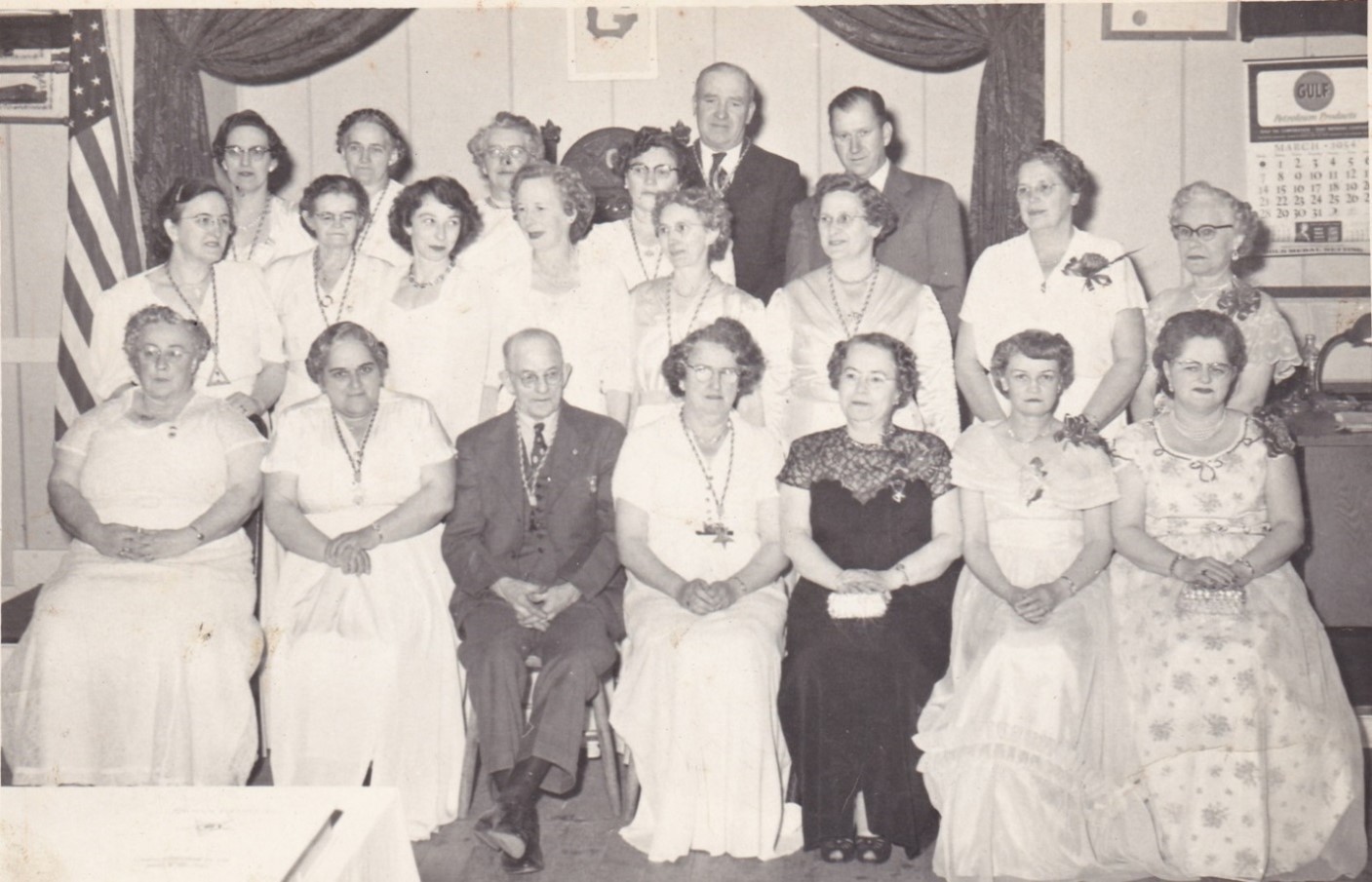
Order of the Eastern Star Installation Ceremony in Sedgwick (undated) Front Row L to R: Myrtle Gray, Phoebe Clapp, Roland Gray (Gatekeeper Sentinel), Agnes Hale, unnamed Installing officer, unnamed Installing officer, unnamed Installing officer. Second Row L to R: Audrey Beede, May Nevells, Geraldine Walsh, Dorothy Keefe, Hilda Hooper, Kathleen Young, Caroline Young, ? possibly the Organist from Orland. Back Row L to R: Louise Billings Webb, Alice Clapp Anderson, Bessie Cooper, Ethel Byard, Leslie Young Associate Patron, Clarence Hale, Patron
In 1893 Captain Grenville became ill with pneumonia on one of his voyages but was able to get back to a dock near home. His son Eugene brought the carriage and took him to the Carleton House which was close by and, there, Clara took care of him until his death several days later. He is buried in Pine Grove cemetery. Clara then began to take in boarders as a way to support herself and her children ages 14 to 21. She must have been fairly successful because in the winter she rented a small cottage at Castine Normal School so her niece Beulah Clapp and daughter Nellie Eliza could go to that school. Clara died in Sedgwick and is also buried in Pine Grove cemetery.

Nellie Eliza Clapp Sargent, Harvey Thurston Clapp, Eugene Payson Clapp, Rowland Grenville Clapp. Nellie and Eugene lived their entire lives in Sedgwick.
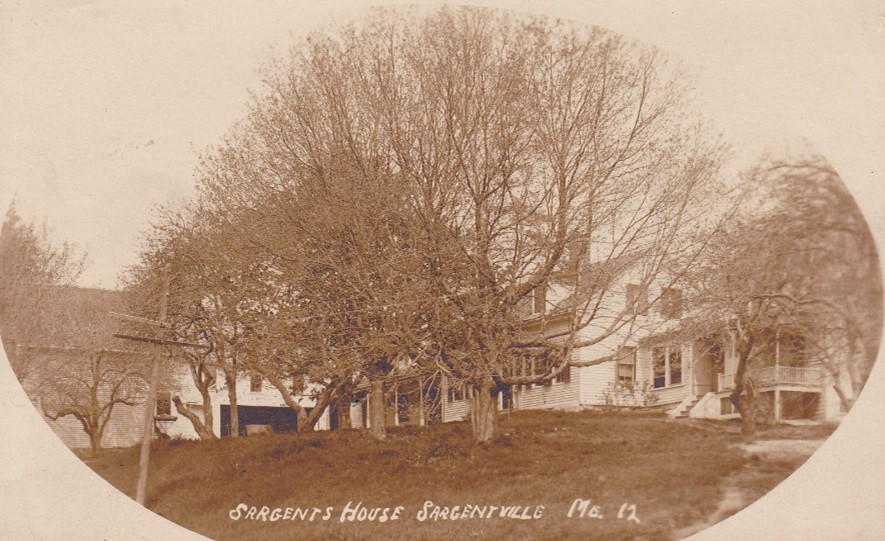
Nellie and her husband Fred ran The Sargent House, an inn known for its hospitality and excellent food, until Fred’s death in 1940. Built in the 1840s, the interior of the house has had several alterations but retains its classic, comfortable appearance.
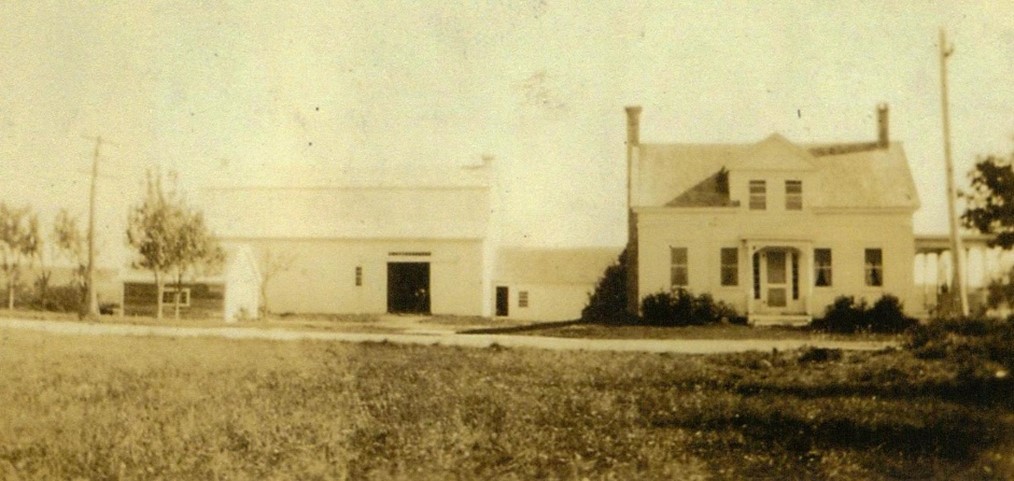
Home of Eugene and Alice Maud Carpenter Clapp on Reach Road, Sedgwick. Eugene Clapp grew up in Sedgwick and when he married Alice, they bought property on Reach Road and raised their seven children there.
This narrative about the Clapp and Thurston families in Sedgwick, Maine reflects the struggles, courage and humanity of the men and women who laid the foundations for meaningful lives for themselves, their children, and the generations that followed.
______________________________
1 https://archive.org/stream/clappmemorialrec00clap/clappmemorialrec00clap_djvu.txt
2 Honey, Mark, Abigail and Sarah Hawes of Castine Navigators and Educators, Lois Moore, editor, 1996, page 294.
3 Vital Records of Sedgwick, Maine, Compiled by Barbara M. Grindle, Picton Press, Rockport, Maine, 2004, pg 233.
4 Ellsworth American Obituary, 1871. http://www.mnopltd.com/jean/
5Personal communication from Carolyn Clapp.
6 Brown Thurston, Thurston Genealogies, Compiled by Brown Thurston, Portland, Maine, Original Copy in the Cornell University Library and on-line https://archive.org/details/cu31924029773508/
7 Chase, Mary Ellen, Jonathan Fisher, Maine Parson 1768-1847, Macmillan Co., New York,1948, page 278.
8Thurston Genealogies, Ibid,

